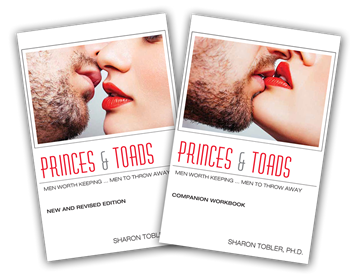all the data needed to determine … whether your person is a keeper, is in very soon after you meet … often by the end of the first date.
the only thing others will observe is your behavior … no one knows what you are feeling or thinking.
in relationships there are only perceptions, not realities … The goal is to meet and understand each other’s perceptions.
our greatest personality assets … are always our greatest character liabilities. What we do best in the world, or how others mostly perceive us, is always a behavior that becomes our curse. For example, if you are known as a “Saint” type, you are also probably a “Doris Doormat.” The goal is to resolve the challenge of Doris without giving up the “Saint.”
it really is true that … how much you love yourself
is equal to how much you can love and be loved.
how do I develop Self-Love? … by setting baby step self-love goals and accomplishing them. I cannot emphasize enough that starting with attainable goals is paramount since the key to development of self-love is the successful accomplishment of these goals. The other necessary ingredient is eliminating negative self talk. These two components are also the keys to
lifting out of a depression.
you will have significantly more respect for yourself … if you resist becoming involved with someone you know will not be good for you.
hearts are like eggs … they cannot nourish until they have been broken. Cherish your broken heart.
guilt is a wasted emotion … holding on to guilt may cause physical, emotional and spiritual harm; adult decisions are driven by conscience.
you teach people … how to treat you.
feeling lonely … is a sign that you are not enjoying your own company.
in the realm of romantic relationships … two halves equal two halves.
most of us would rather stay in familiar misery … than risk venturing into unknown bliss.
the more you fill yourself up … the more you have to give.
the greatest life lessons are usually learned from perceived failures … so always think of a failure as an opportunity.
do not be afraid to suffer … it is one of our greatest teachers.
lies erode trust … even the white ones.
developing a meaningful and healthy relationship takes time … you cannot hurry mother nature.
the only one being hurt by a grudge … is the one holding it.
human beings have between 60,000 to 70,000 thoughts a day; 95% of which are negative and repetitive … To get out of this quagmire, one must learn to live in the present moment.. Living in the past elicits depression, while living in the future gives rise to anxiety. When one can remain in the present moment, both of these very unpleasant feelings are escaped.
mind-reading is a myth … If your partner guesses your thoughts and feelings correctly, it was an accident. It is your job to express your thoughts and feelings.
the truth will set you free … but first it may make you miserable.
a silence can be sacred or toxic … know the difference.
addictive relationships can be as harmful … as addictions to substances.
think of boundaries as sandboxes … your sandbox is your sandbox,
the other's sandbox is the other's sandbox … you do not belong in each other's sandbox without an invitation.
it is never acceptable … to fight in front of the kids.
children learn what they observe … not what they are told.
positive reinforcement … promises more long lasting success than punishment.
words empower and disempower … delete: try, can’t and should from your vocabulary. say: allow more often. Notice how different it feels when you say: “he takes me for granted”, verses, “I allow him to take me for granted”.
relationships change whether we want them to or not … we resist change because we fear uncharted territory.
anticipatory anxiety is almost always worse … than the feared object or experience.
mastering the art of letting go is a valuable life-lesson … as life really is a series of hellos and goodbyes. The ability to let go of whom or what was in the past provides space for who or what is in the present or future.
do not be afraid to make decisions … They are life-lessons.
meaningful change takes time … so be patient.
no decision … is a decision. Just like not acting is an action.
of all the misconceptions about love, the most powerful and pervasive is … the belief that falling in love IS love or at least one of the manifestations of love. In
truth, the most positive reason for falling in love is that it provides the opportunity to transition from the love myth to genuine love.
falling in love is an unconscious act … staying in love is a conscious one.
there are 5 major feelings … mad, sad, glad, scared, bad (shame).
the longer you stay in a bad situation … the harder it is to get out.
intimacy … is usually avoided because we are afraid of being vulnerable. We believe vulnerability is a sign of weakness. On the contrary, vulnerability takes courage!
the norms that you will live by for the duration of the relationship … are being formed from the minute you meet.
trust is the foundation from which … a loving and healthy relationship is built.
commitment … is the bedrock of genuine love.
commitment … promotes vulnerability, a critical ingredient for relationship intimacy.
commitment … increases motivation to resolve relationship challenges, rather than “calling it quits”.
do you prefer acute or chronic pain? … if you choose to leave a bad situation, the pain will be acute, but in time the pain will end. If you stay in a bad situation you are promised chronic pain.
inner strength and control are not synonymous … The underlying feeling driving inner strength is joy. The underlying feeling driving control is fear.
a very important question to ask yourself when you begin to assess the prospect is … “Would I want my best friend or sibling involved with this person?”
remember that when you marry … you are marrying your partner’s family.
timing is … everything.
believing that others cause you pain and pleasure is a myth … those feelings are already
inside you. They are just brought out by others.
feelings just are … you cannot control them … but you CAN control your thoughts and behaviors which will have a profound impact on your feelings. Positive thoughts and behaviors beget positive feelings, the opposite is also true.
unacceptable behavior is just that … unacceptable … do not compromise yourself.
the opposite of love is not hatred … it is indifference.
LAT or Living Apart Together … is a current trend in which committed (married and unmarried) couples make a decision to live apart when living together is also an option. Whichever decision you make, be sure that it has been made consciously and with forethought.
LAT is not for everybody … however, it is my opinion that for some, making the choice to live apart is the difference between staying together and ending the relationship.
a topic often avoided in long-term relationships (or marriage) is death
… it’s going to happen. Not discussing it does not delay it. Your mate is the best person with whom to talk over your wishes. Draw up a living will.
resentment … is the killer of relationships.
These nuggets are but a few from my NEW & REVISED Edition of Princes & Toads.
Copyright 2016-2020



 Dr. Tobler grew up overseas. She lived in Europe, the Far and Middle East. She returned to the United States as a young adult to begin her undergraduate work at Georgetown University in Washington, D.C.
Dr. Tobler grew up overseas. She lived in Europe, the Far and Middle East. She returned to the United States as a young adult to begin her undergraduate work at Georgetown University in Washington, D.C.  She wholeheartedly agrees with the numerous
research studies demonstrating that the
mainstream methods of treatment are about equal in effectiveness; and that the true keys to successful therapy are: client motivation,
therapist competence, and the quality of the client-therapist
relationship.
She wholeheartedly agrees with the numerous
research studies demonstrating that the
mainstream methods of treatment are about equal in effectiveness; and that the true keys to successful therapy are: client motivation,
therapist competence, and the quality of the client-therapist
relationship.





 Dr. Tobler has authored two self-help books:
Dr. Tobler has authored two self-help books:


